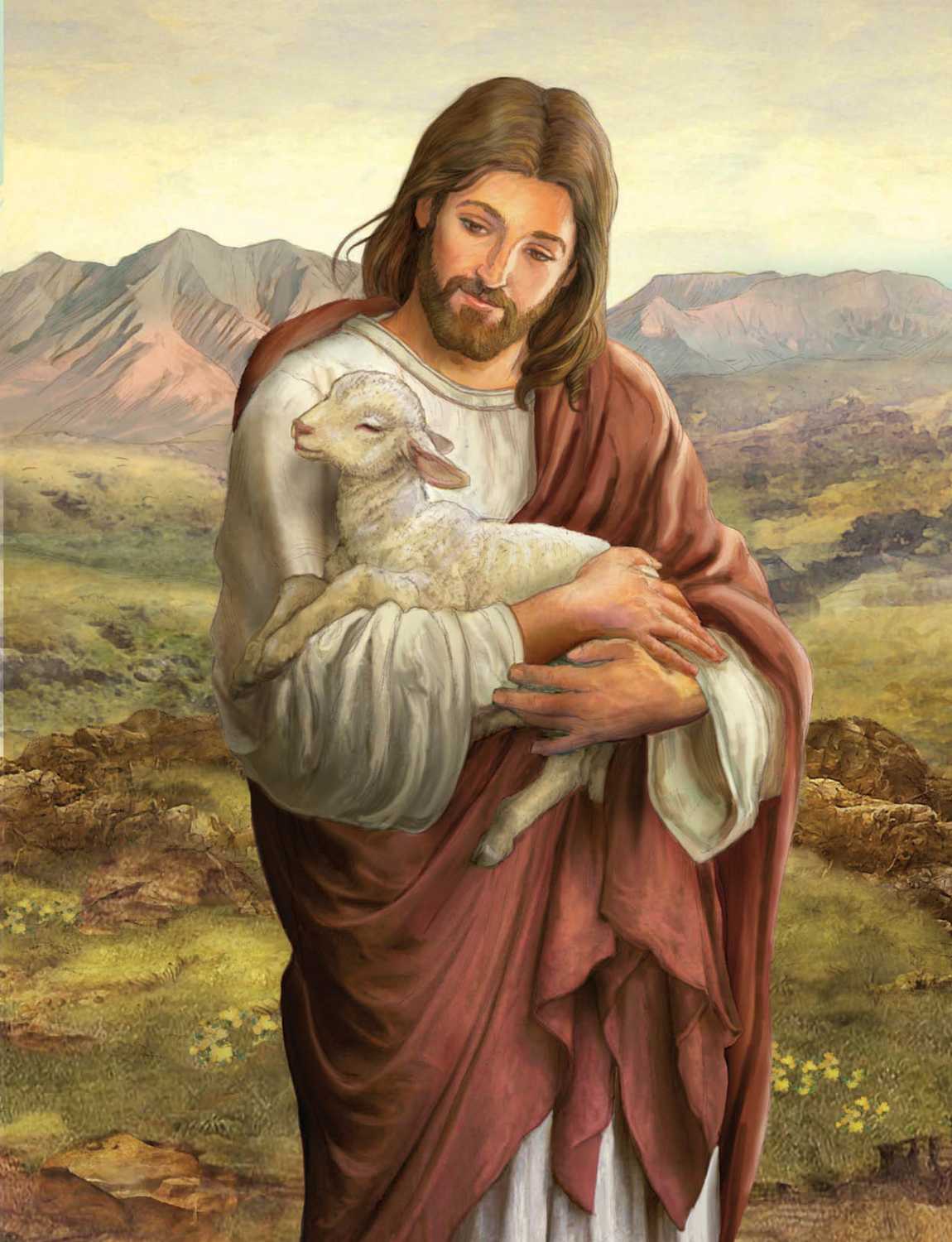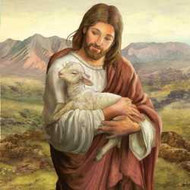Abundant Life

April 28, 2023
Author: Hannah DeVivo
Peace be with you!
In today’s blog post I will be taking a look at the Gospel for this Sunday, the fourth Sunday of Easter.
John 10:1-10
Jesus said:
“Amen, amen, I say to you,
whoever does not enter a sheepfold through the gate
but climbs over elsewhere is a thief and a robber.
But whoever enters through the gate is the shepherd of the sheep.
The gatekeeper opens it for him, and the sheep hear his voice,
as the shepherd calls his own sheep by name and leads them out.
When he has driven out all his own,
he walks ahead of them, and the sheep follow him,
because they recognize his voice.
But they will not follow a stranger;
they will run away from him,
because they do not recognize the voice of strangers.”
Although Jesus used this figure of speech,
the Pharisees did not realize what he was trying to tell them.
So Jesus said again, “Amen, amen, I say to you,
I am the gate for the sheep.
All who came before me are thieves and robbers,
but the sheep did not listen to them.
I am the gate.
Whoever enters through me will be saved,
and will come in and go out and find pasture.
A thief comes only to steal and slaughter and destroy;
I came so that they might have life and have it more abundantly.”

Who is the Gatekeeper of Your Soul?
One of the first images that Jesus gives us in this passage is the gatekeeper. He says that the gatekeeper opens the gate for the Shepherd to come in and lead the sheep. So, if Jesus is the Shepherd and we are the sheep, what is a possible interpretation of the gatekeeper? I believe it is our conscience. It occurred to me while reading the text that Jesus points out that the Shepherd is not a stranger. It seems reasonable that if a stranger came to the gate, the gatekeeper would not let him in. The Catechism of the Catholic Church teaches us that conscience is present in the heart of each of us. It judges the choices we make–approving those that are good and denouncing the ones that are evil. If we make the ways of goodness and righteous known to our souls, the ways of evilness will come as strangers to our gate.
If we form our consciences to align with what is true and good, they will act as very exceptional gatekeepers. The task here (which is lifelong) is to make sure that our conscience knows to let in what is good and turn away what is evil.
“Conscience is a judgment of reason whereby the human person recognizes the moral quality of a concrete act that he is going to perform, is in the process of performing, or has already completed. In all he says and does, man is obliged to follow faithfully what he knows to be just and right. It is by the judgment of his conscience that man perceives and recognizes the prescriptions of the divine law:
Conscience is a law of the mind; yet [Christians] would not grant that it is nothing more; I mean that it was not a dictate, nor conveyed the notion of responsibility, of duty, of a threat and a promise…. [Conscience] is a messenger of him, who, both in nature and in grace, speaks to us behind a veil, and teaches and rules us by his representatives. Conscience is the aboriginal Vicar of Christ.”—John Henry Cardinal Newman (CCC paragraph 1778)
“Conscience must be informed and moral judgment enlightened. A well-formed conscience is upright and truthful. It formulates its judgments according to reason, in conformity with the true good willed by the wisdom of the Creator. The education of conscience is indispensable for human beings who are subjected to negative influences and tempted by sin to prefer their own judgment and to reject authoritative teachings.
“The education of the conscience is a lifelong task. From the earliest years, it awakens the child to the knowledge and practice of the interior law recognized by conscience. Prudent education teaches virtue; it prevents or cures fear, selfishness and pride, resentment arising from guilt, and feelings of complacency, born of human weakness and faults. The education of the conscience guarantees freedom and engenders peace of heart.” (CCC paragraphs 1783 and 1784)

What is the Abundant Life That God Has for You?
The Greek word for life is bíos. The meaning is the literal life that you have—the root of the word biology. In this Gospel, Jesus does not use bíos when describing abundant life, but the word zoe. Zoe means the uncreated, eternal life of God, the divine life uniquely possessed by God. It describes the vitality and quality of life. Jesus is not saying that He came just so we could continue existing, but that we could have lives full of quality and richness, and more: eternal life.
Take a moment to consider some aspects of the life that you dream of.
Think of the peace, happiness, connection, and sense fulfillment that you deeply long for. How is Jesus saying that you can attain this type of life? He tells us clearly in this Gospel that HE is the gate. Whoever enters through Jesus Christ will be saved, and will come in and go out and find pasture. What will we find in this pasture? Abundant life! This is such a beautiful truth, because the world says that we have to work hard, get ahead, and earn the type of life that we long for. Oftentimes we believe that more money will lead to our happiness so we should work hard to get it. But Jesus is saying that instead, we must be led to the pasture of life by and through the Good Shepherd.

What Thieves and Robbers are Destroying the Abundance of Your Life?
Jesus warns us of the thief and robber—the enemy of our soul—who comes to steal, slaughter, and destroy. Can you identify the thieves and robbers in your life that are stealing or destroying the abundance of your life? Each of us are fighting our own battle and may have thieves come in different forms. It is important for us to continue trying to identify them and bring them to light. As we know, thieves and robbers like to operate in the darkness. They like to try and isolate us. They lie and sneak around to take advantage of us. The good news is that each of us has a light within us. We are called to let it shine, and when we feel that it is getting dim, we can go to Jesus—in our hearts, in His Word, and in the Blessed Sacrament. He says, “Come to Me, all who are weary and heavy-laden, and I will refresh you” (Matthew 11:28). We can ask the Holy Spirit to show us the thieves and robbers that are trying to break in and ruin the richness of our lives.
We do not have to remain passive and allow the gifts that God has given us to be taken away so easily. God has given us the answers, the salvation, the grace, and the hope. He has offered to take our yoke. He has reached down and given us all of Himself. In addition to these things, He has given us free will. So, the decision is yours. Will you accept the abundance that God wants to give you? Will you cling to Him when the thieves come in? Will you allow Him to carry you, fight your battles, and move mountains for you? I hope you are answering with a resounding “yes”, and I hope that you experience the fullness of the love that He has for you. God love you!
Here at Autom, we have many great devotional items to help you remember your Good Shepherd and the abundant life that He has for you! Click here to get yours!

Before You Go
Have you accepted the abundant life that God wants to give you?
What Thieves and Robbers are Destroying the Abundance of Your Life?
Did you learn anything new in this article?
I would LOVE to hear from you. Send me an email to Catholic-Living@Autom.com Be sure to follow and subscribe to the links below for more tips and information.
![[Consumer]Autom [Consumer]Autom](https://cdn11.bigcommerce.com/s-zjzn8ssx4n/images/stencil/350x117/autom_w_tag_1641942220__31718.original.jpg)
